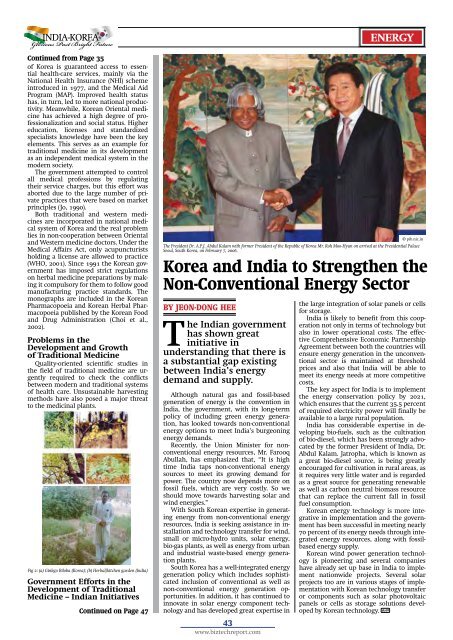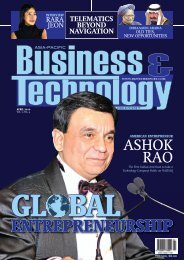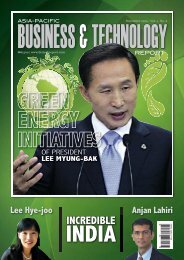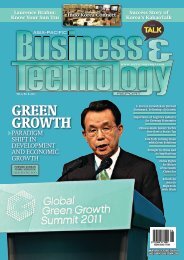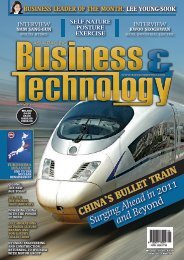INDIA-KOREA - Asia-Pacific Business and Technology Report
INDIA-KOREA - Asia-Pacific Business and Technology Report
INDIA-KOREA - Asia-Pacific Business and Technology Report
You also want an ePaper? Increase the reach of your titles
YUMPU automatically turns print PDFs into web optimized ePapers that Google loves.
<strong>INDIA</strong>-<strong>KOREA</strong><br />
Glorious Past Bright Future<br />
Continued from Page 35<br />
of Korea is guaranteed access to essential<br />
health-care services, mainly via the<br />
National Health Insurance (NHI) scheme<br />
introduced in 1977, <strong>and</strong> the Medical Aid<br />
Program (MAP). Improved health status<br />
has, in turn, led to more national productivity.<br />
Meanwhile, Korean Oriental medicine<br />
has achieved a high degree of professionalization<br />
<strong>and</strong> social status. Higher<br />
education, licenses <strong>and</strong> st<strong>and</strong>ardized<br />
specialists knowledge have been the key<br />
elements. This serves as an example for<br />
traditional medicine in its development<br />
as an independent medical system in the<br />
modern society.<br />
The government attempted to control<br />
all medical professions by regulating<br />
their service charges, but this effort was<br />
aborted due to the large number of private<br />
practices that were based on market<br />
principles (Jo, 1990).<br />
Both traditional <strong>and</strong> western medicines<br />
are incorporated in national medical<br />
system of Korea <strong>and</strong> the real problem<br />
lies in non-cooperation between Oriental<br />
<strong>and</strong> Western medicine doctors. Under the<br />
Medical Affairs Act, only acupuncturists<br />
holding a license are allowed to practice<br />
(WHO, 2001). Since 1991 the Korean government<br />
has imposed strict regulations<br />
on herbal medicine preparations by making<br />
it compulsory for them to follow good<br />
manufacturing practice st<strong>and</strong>ards. The<br />
monographs are included in the Korean<br />
Pharmacopoeia <strong>and</strong> Korean Herbal Pharmacopoeia<br />
published by the Korean Food<br />
<strong>and</strong> Drug Administration (Choi et al.,<br />
2002).<br />
Problems in the<br />
Development <strong>and</strong> Growth<br />
of Traditional Medicine<br />
Quality-oriented scientific studies in<br />
the field of traditional medicine are urgently<br />
required to check the conflicts<br />
between modern <strong>and</strong> traditional systems<br />
of health care. Unsustainable harvesting<br />
methods have also posed a major threat<br />
to the medicinal plants.<br />
Fig 2: (a) Ginkgo Biloba (Korea); (b) Herbal/kitchen garden (India)<br />
Government Efforts in the<br />
Development of Traditional<br />
Medicine – Indian Initiatives<br />
Continued on Page 47<br />
Although natural gas <strong>and</strong> fossil-based<br />
generation of energy is the convention in<br />
India, the government, with its long-term<br />
policy of including green energy generation,<br />
has looked towards non-conventional<br />
energy options to meet India’s burgeoning<br />
energy dem<strong>and</strong>s.<br />
Recently, the Union Minister for nonconventional<br />
energy resources, Mr. Farooq<br />
Abullah, has emphasized that, “It is high<br />
time India taps non-conventional energy<br />
sources to meet its growing dem<strong>and</strong> for<br />
power. The country now depends more on<br />
fossil fuels, which are very costly. So we<br />
should move towards harvesting solar <strong>and</strong><br />
wind energies.”<br />
With South Korean expertise in generating<br />
energy from non-conventional energy<br />
resources, India is seeking assistance in installation<br />
<strong>and</strong> technology transfer for wind,<br />
small or micro-hydro units, solar energy,<br />
bio-gas plants, as well as energy from urban<br />
<strong>and</strong> industrial waste-based energy generation<br />
plants.<br />
South Korea has a well-integrated energy<br />
generation policy which includes sophisticated<br />
inclusion of conventional as well as<br />
non-conventional energy generation opportunities.<br />
In addition, it has continued to<br />
innovate in solar energy component technology<br />
<strong>and</strong> has developed great expertise in<br />
43<br />
www.biztechreport.com<br />
ENERGY<br />
Korea <strong>and</strong> India to Strengthen the<br />
Non-Conventional Energy Sector<br />
by Jeon-Dong Hee<br />
The Indian government<br />
has shown great<br />
initiative in<br />
underst<strong>and</strong>ing that there is<br />
a substantial gap existing<br />
between India’s energy<br />
dem<strong>and</strong> <strong>and</strong> supply.<br />
© pib.nic.in<br />
The President Dr. A.P.J. Abdul Kalam with former President of the Republic of Korea Mr. Roh Moo-Hyun on arrival at the Presidential Palace<br />
Seoul, South Korea, on February 7, 2006.<br />
the large integration of solar panels or cells<br />
for storage.<br />
India is likely to benefit from this cooperation<br />
not only in terms of technology but<br />
also in lower operational costs. The effective<br />
Comprehensive Economic Partnership<br />
Agreement between both the countries will<br />
ensure energy generation in the unconventional<br />
sector is maintained at threshold<br />
prices <strong>and</strong> also that India will be able to<br />
meet its energy needs at more competitive<br />
costs.<br />
The key aspect for India is to implement<br />
the energy conservation policy by 2021,<br />
which ensures that the current 35.5 percent<br />
of required electricity power will finally be<br />
available to a large rural population.<br />
India has considerable expertise in developing<br />
bio-fuels, such as the cultivation<br />
of bio-diesel, which has been strongly advocated<br />
by the former President of India, Dr.<br />
Abdul Kalam. Jatropha, which is known as<br />
a great bio-diesel source, is being greatly<br />
encouraged for cultivation in rural areas, as<br />
it requires very little water <strong>and</strong> is regarded<br />
as a great source for generating renewable<br />
as well as carbon neutral biomass resource<br />
that can replace the current fall in fossil<br />
fuel consumption.<br />
Korean energy technology is more integrative<br />
in implementation <strong>and</strong> the government<br />
has been successful in meeting nearly<br />
70 percent of its energy needs through integrated<br />
energy resources, along with fossilbased<br />
energy supply.<br />
Korean wind power generation technology<br />
is pioneering <strong>and</strong> several companies<br />
have already set up base in India to implement<br />
nationwide projects. Several solar<br />
projects too are in various stages of implementation<br />
with Korean technology transfer<br />
or components such as solar photovoltaic<br />
panels or cells as storage solutions developed<br />
by Korean technology. A-P


